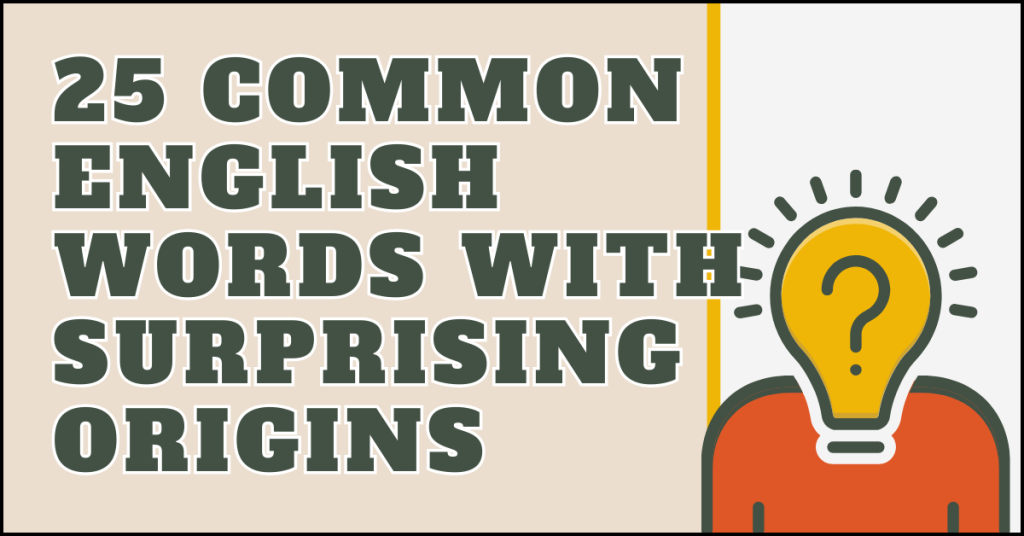English is packed with words we use daily without giving their origins a second thought. However, many are wild stories, strange twists, and some flat-out weird facts that’ll stick with you longer than your last grammar lesson.
In this article, you’ll discover 25 English words with surprising origins. Some are from ancient myths, and others are from Latin, Greek, or bizarre historical practices.
If you’re learning English or love language, these stories will help you remember new words faster and make vocabulary feel less like a chore. Plus, they’ll give you fun trivia to throw into any conversation.
Let’s dig into how everyday words can carry centuries of history.
What are the common English words with surprising origins?
- Nice
Originally from the Latin term nescius, meaning “ignorant”, the word “nice” traveled through Old French before landing in English.
Over the centuries, its meaning evolved from foolish to precise to agreeable. Today, it’s one of the most overused compliments in English.
- Silly
Silly once meant blessed or innocent in Old English (sēlīĥ). Over time, the meaning shifted to describe someone naive or weak, eventually landing on the idea of acting foolish. It’s a clear case of a word taking a life of its own.
- Salary
The word “salary” comes from the Latin term “salarium,” which is tied to salt. Salt was a valuable commodity in ancient Rome; sometimes, it was part of a soldier’s payment or allowance.
People eventually associated this allowance with earning money, so “salarium” evolved into the word we know today for the money we earn at work.
- Clue
Clue initially meant “a ball of yarn or thread,” spelled “clew.” In Greek mythology, Theseus used a thread to find his way out of the Minotaur’s labyrinth.
Over time, this idea of a guiding thread led to the modern usage of “clue” to mean evidence that leads you to the correct answer.
- Muscle
The word “muscle” traces back to the Latin “musculus,” meaning “little mouse.” The Romans thought specific muscles looked like mice scurrying beneath the skin. This funny comparison gave us the modern term for the parts of the body that help us move and lift.
- Nightmare
Nightmare comes from an Old English belief involving an evil spirit called a “mare” that would sit on people’s chests as they slept. This spirit supposedly caused terrible dreams.
Over centuries, the word’s meaning shifted to describe terrifying dreams, dropping much of the original folklore.
- Sandwich
The term “sandwich” comes from John Montagu, the 4th Earl of Sandwich, who was an avid card player.
He wanted to eat without leaving the gaming table, so he asked for meat between two slices of bread. Others began requesting their meals “the same as Sandwich,” and the word stuck.
- Quarantine
Quarantine comes from the Italian phrase “quaranta giorni,” which means “forty days.” During outbreaks in the Middle Ages, ships had to stay isolated for 40 days to prevent the spread of disease.
This measure was strict, and the concept of isolation became associated with the word we use for enforced separation.
- Checkmate
Checkmate comes from the Persian phrase “shah mat,” meaning “the king is helpless” in chess.
Early traders and travelers carried this term from the Middle East into Europe. Over time, it became “checkmate,” signifying the end of the game when the king couldn’t escape capture.
- Cereal
The word “cereal” comes from Ceres, the Roman goddess of agriculture and harvest. Ancient Romans believed Ceres oversaw grains and fertility, so they linked her name to grain-based foods. Today, the word covers everything from breakfast flakes to grain products in general.
- Hazard
Hazard traces back to the Arabic word “al-zahr,” which refers to dice or a game of chance. Crusaders likely brought the term to Europe, which evolved to mean something dangerous. Eventually, “hazard” came to describe any perilous situation.
- Brand
The word “brand” originally meant a piece of burning wood. It later evolved to mean the mark ranchers used to burn onto cattle. Over centuries, people have applied it to the concept of marking products or businesses, so now “brand” describes a company’s identity in the marketplace.
- Window
Window comes from the Old Norse “vindauga,” formed by “vindr” (wind) and “auga” (eye). Vikings called a window the “wind’s eye” because it was an opening that let in air and light. This simple idea became our modern word for the openings we look through.
- Ketchup
“Ketchup” is believed to come from the Chinese word “ke-tsiap,” a type of fermented fish sauce. European traders sampled this sauce and tried to recreate it back home with different ingredients.
Over time, the tomato became the prominent flavor, morphing into what we recognize today as ketchup.
- Malaria
Malaria is from Medieval Italian, “mala aria,” meaning “bad air.” People once thought swampy areas had harmful vapors that caused fevers. Later discoveries showed mosquitoes were the culprits, but the name stuck, reminding us of an older medical belief.
- Alcohol
Alcohol traces back to the Arabic word “Al-Kuhl,” which refers to a fine powder used as eyeliner (kohl).
Alchemists extended the term to mean a distilled essence or spirit. Gradually, that sense of a distilled product turned into the modern usage for liquor or beverages containing ethanol.
- Robot
Robot comes from the Czech word “robot, ” which means forced labor or drudgery. Playwright Karel Čapek popularized it in his 1920 play R.U.R. (Rossum’s Universal Robots).
The concept spread worldwide, and “robot” became the term for mechanical beings or automated machines capable of work.
- Blunder
Blunder may be related to the Scandinavian word “blundra,” which suggests stumbling or fumbling. As English absorbed influences from Norse dialects, it picked up the sense of a clumsy mistake.
Today, it refers to a significant error, but it started with the idea of physically stumbling around.
- Mushroom
The origin of “mushroom” might be traced back to the French “mousseron,” connected with moss or something that grows in damp places.
Early foragers found mushrooms in humid and mossy forest areas. Over time, the English word “mushroom” emerged to describe various edible fungi.
- Lord
It began as Old English “hlaford,” which derived from “hlaf-weard,” meaning “keeper of the bread.” In early societies, the person who provided food held power. The word shifted to “lord,” signifying someone of authority, but it came from the idea of a bread distributor or guardian.
- Lady
Lady pairs with “lord” in Old English history. It emerged from “hlæfdige,” which means “bread kneader.” While “lord” focused on sharing bread, “lady” was tied to preparing it, reflecting how titles sprang from daily life tasks.
- Algebra
“Algebra” stems from the Arabic “al-jabr,” part of the more extended title of a 9th-century mathematical text by Al-Khwarizmi. The phrase included the concept of “reunion of broken parts,” referring to a method of solving equations.
After translations reached Europe, “al-jabr” became “algebra,” defining a significant branch of mathematics.
- Chocolate
Chocolate likely comes from the Nahuatl word “xocolātl,” which the Aztecs used. Spanish explorers found a bitter cacao beverage in Mesoamerica and brought it to Europe.
Over time, people sweetened the drink, leading to the delicious treat that made “chocolate” one of the most beloved words worldwide.
- Avatar
This word is from Sanskrit and means a manifestation of a deity who descends to earth. English speakers borrowed the term to describe a representation of a person or being.
Today, it often refers to digital personas in online environments, yet it began as a concept of divine descent in ancient Indian texts.
- Boycott
Boycott emerged from the name of Captain Charles Boycott, a land agent in Ireland. Due to unfair practices, local tenants refused to deal with him, cutting him off socially and economically. This effective protest method introduced the term “boycott,” meaning a collective refusal to engage.
Where can you find common English words with surprising origins?
There are many ways to explore English words with surprising origins, especially if you know where to look. Here are five tools and platforms that help learners uncover word histories and build more substantial vocabulary.
Use Language Learning Platforms and Apps
A great way to learn word origins is through gamified tools that make language study fun and memorable. One such platform is Lingo War, a browser-based vocabulary game that replaces passive study with short, targeted challenges.
Why Lingo war works:
- You can start immediately without an account or log-in.
- It runs entirely in your browser.
- Each session is quick and perfect for busy learners.
- Games adapt based on your progress and performance.
- A built-in dashboard helps you track scores and growth.
- It covers many word categories so that you can focus on specific areas.
Whether you’re a student, working professional, or casual learner, this format encourages consistent progress without burnout. Lingo war makes vocabulary study active, repeatable, and engaging, improving retention.
Explore Online Etymology Dictionaries
Websites like Etymonline give you in-depth explanations of word origins. Search almost any English word and get historical context, root languages, and usage evolution. It’s one of the most reliable free resources for understanding how words have changed.
Read Historical Texts and Language Blogs
Blogs from universities, language educators, or trusted linguists often explore English word history in short, digestible formats. For example, the Oxford English Dictionary Blog includes articles about surprising etymologies, slang origins, and more. These posts can add variety and context to your learning routine.
Use Flashcards with Etymology Notes
Many learners use flashcards to review new vocabulary. Adding a short note about each word’s origin helps connect it to a memory. Apps like Anki or Quizlet allow for custom entries, so you can build a personalized deck that includes definitions, sample sentences, and origin stories.
Other Tips When Learning New Words
- Link Words to Stories
Try turning each word into a mini-narrative that connects it to its origin. If you hear that “panic” stems from Pan’s mischief in the wild, picture the fear he might incite. These mental associations help cement new vocabulary in your memory.
- Read and Listen Widely
Frequent exposure is crucial for language acquisition. Reading newspapers, novels, or research articles introduces words in various settings. Listening to podcasts and watching videos further reinforces how words are used in everyday speech.
- Space Your Practice
Spaced repetition is a time-tested approach to memory. Rather than cramming once a day, revisit words at intervals to reinforce them. Apps and websites often provide spaced repetition systems that schedule your reviews automatically.
- Engage in Conversations
Casual chats with friends or peers offer prime opportunities to practice. If you learn a word like “blunder,” try using it in a sentence when you or someone else makes a small mistake. This active usage strengthens your recall and helps you sound more fluent.
- Create Word Associations
Building a web of connections among words makes them stick. For instance, if you learn “quarantine” from the Old Italian reference to “forty days,” link it to historical contexts or modern isolation measures. The more hooks you create, the easier it is to retrieve vocabulary later.
- Keep a Vocabulary Journal
Write down any new or interesting terms you come across, along with definitions and short origin notes. Adding context or sample sentences can improve retention. Reviewing your journal weekly or monthly also helps maintain long-term progress.
- Set Manageable Goals
Consider aiming for a specific number of new words per week rather than an unstructured approach. This will help you gauge progress and keep motivation levels steady. According to certain educational studies, focused goals can increase learning efficiency by nearly 30%.
Final Thoughts
Language carries layers of history, revealing how people once lived, traded, and created stories. By trying to learn English words with surprising origins, you enrich your understanding of where these terms began and why they matter.
Each discovery adds color to daily conversation, making every interaction more meaningful. If you stay curious and keep exploring, digging into word histories is rewarding and practical.
Whether you’re a student or a professional, devoting a little time to etymology can boost your vocabulary and expand your perspective.



